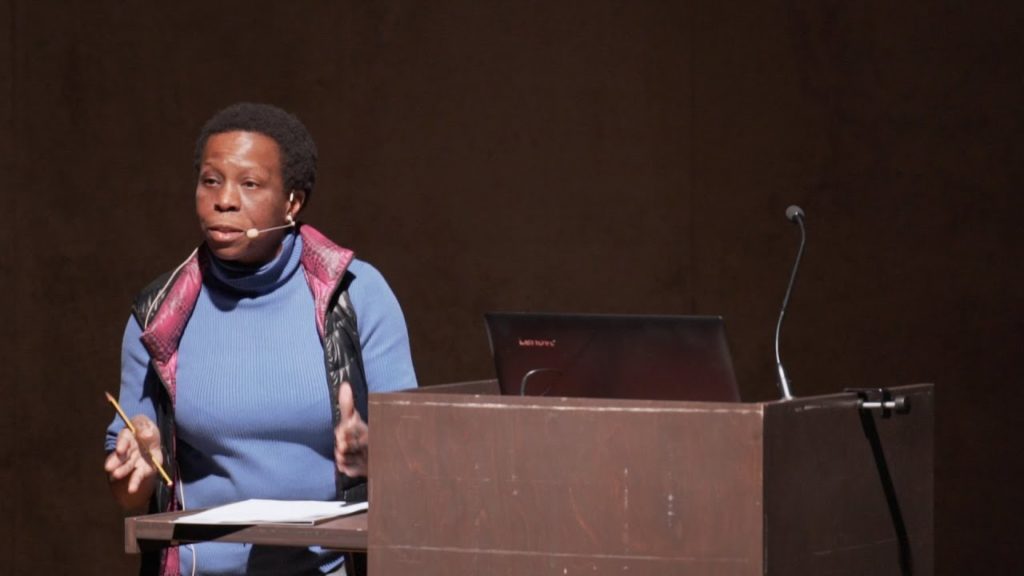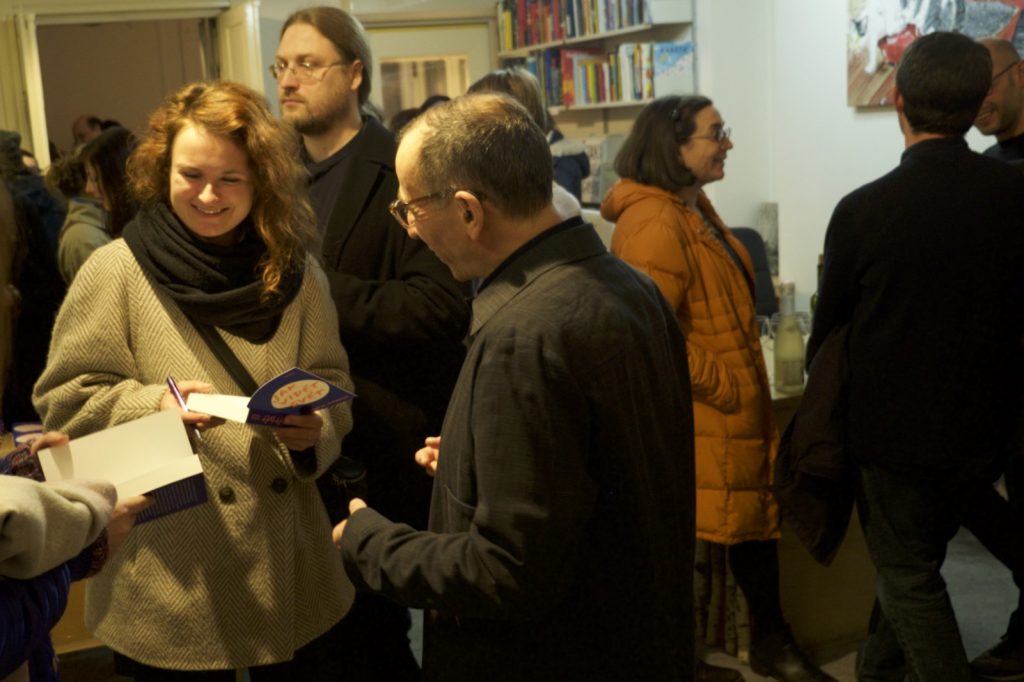Search
04 Emergency and Emergence
03 Sonic Continuum
02 Critical Pedagogies
01 On Translations
Critical Pedagogies: The Learning Collective in the Awakening of the COVID-19 Pandemic
Carolina Rito
This text reflects upon the Critical Pedagogies programme at Nottingham Contemporary and the challenges that the awakening of the COVID-19 outbreak poses to education. In this text, the programme’s curator Carolina Rito delves into the neoliberalisation of educational institutions and how this process is transforming our learning experience – within and outside academia.
On CAMPUS: Reflections on Collective Knowledge Production
Alexandra Chairetaki Gráinne Charlton Laurie Cummins Phoebe Eustance Jade Foster Colette Griffin Milika Muritu Hugh Nicholson Ese Onojeruo Jessica Piette Raúl Valdivia
In 2019, Nottingham Contemporary launched CAMPUS, a non-formal education programme with a focus on critical pedagogies. Throughout a series of events which included seminars, lectures, and informal conversations, CAMPUS participants engaged in critical dialogues and collective learning. The views expressed in this text are not representative of the entire CAMPUS cohort.
Theory versus Practice: A Notice to Appear
Andrea Průchová Hrůzová
What are the frequent contradictions between theory and practice in the field of public pedagogy? In this open reflection, Andrea Průchová Hrůzová revisits a decade-long experience of running the Prague-based Platform for the Study and Promotion of Visual Culture Fresh Eye, while mapping the systemic, institutional and discursive limits of critical public pedagogy within the realm of the public education system.
Being Open
Joaquim Moreno
What does it mean for education to be ‘open to people, places, methods and ideas’? Architect and academic Joaquim Moreno recalls the well-known charter of the Open University, a pioneering initiative established in Milton Keynes in the late 1960s, to reveal potential shortcomings in today’s remote learning initiatives. By outlining its experiments with new modes of disseminating knowledge at a distance through a ‘blended system’ of resources, methods and channels, Moreno traces how it inventively fulfilled its pedagogical commitment to openness.
Public Politics / Política Pública
Amò Coletivo
How can collaborative art practices exist in contexts that are still attached to the idea of art as a contemplative practice? In this essay, Amò Colectivo reflect on the ‘Public Politics’ project they developed with the inhabitants of the Little Africa neighbourhood in Rio de Janeiro, engaging with questions of how community knowledge is organised and understood as art.
Praktik Spasial
Gudskul farid rakun Sol Cai Laksmi Lilu Herlambang Ahmad Hilal Duta Adipati Gusmarian
Gudskul (Contemporary Art Collective and Ecosystem Studies) is a public learning space established in 2015 by three Jakarta-based art collectives: ruangrupa, Serrum, and Grafis Huru Hara (GHH), who practice and expand the understanding of collective values – such as equality, sharing, solidarity, friendship, and togetherness.
Walking to School Through a Camp: A Short Tale of Infrastructure
Irit Rogoff
Irit Rogoff recounts a visit to the wartime labor camp at Mauthausen, Austria, and considers how the site might act as a space for education.
Distributed Learning
Mark Jarzombek
In the age of COVID-19 and social distancing, Mark Jarzombek weighs up digital learning platforms against the classroom lecture as a pedagogical tool.
The Age of Wildfire
Lesley Lokko
Graduate School of Architecture Summer Show, November 2017. Photo: Tristan McLaren. I began writing this essay weeks before I left South Africa in November 2019 for good; picked it up again a week after my arrival in New York City and finished it in the midst of the global COVID-19 pandemic, which has forced the…
System Building
Elain Harwood
Architectural historian Elain Harwood considers the story of CLASP (Consortium of Local Authorities Special Programme) and its programme of system-built schools in Nottinghamshire as an example of successful collaboration between public architects and government ministries.
Deschooling Architecture
Sol Perez-Martinez
Sol Perez-Martinez traces how deschooling theory has been applied to urban learning initiatives in the UK that sought to widen participation in the built environment and encourage education for action.
Politics as Pedagogy
Santhosh S.
This text considers the site of India’s recent large-scale public demonstrations as pedagogical tools, alternative to the university.
Editorial
Nick Axel Bill Balaskas Nikolaus Hirsch Sofia Lemos Carolina Rito
Architectures of Education is a collaboration between Nottingham Contemporary, Kingston University, and e-flux Architecture, and a cross-publication with The Contemporary Journal. Drawing on a three-day public programme at Nottingham Contemporary on November 7–9, 2019, the series features contributions by Ramon Amaro, Aoife Donnelly and Kristin Trommler, Gudskul, Elain Harwood, Tom Holert, Lesley Lokko, Sol Perez-Martinez, Irit Rogoff, Santhosh S., and more.
Ramon Amaro and farid rakun
Ramon Amaro farid rakun
Architectures of Education is a collaboration between Nottingham Contemporary, Kingston University, and e-flux Architecture, and a cross-publication with The Contemporary Journal. An essay relating to this video is available here.
Contemporary School Design and Architectural Challenges for the African Classroom in a 21st Century Educational Landscape
Ola Uduku
Ola Uduku is Research Professor in Architecture at the Manchester School of Architecture.
Interview with farid rakun
farid rakun
The interview with farid rakun, member of ruangrupa, happened in the context of the conference Architectures of Education at Nottingham Contemporary in November 2019. In the interview conducted by Manuel Ángel Macia, rakun explored ruangrupa’s project in Jakarta, the ideas behind the notion of ‘collective of collectives’, and the upcoming Documenta 15. Manuel Ángel Macia…
Interview with Tom Holert
Tom Holert
The interview with researcher, writer, and curator Tom Holert happened in the context of the conference Architectures of Education at Nottingham Contemporary, in November 2019. In the interview conducted by architecture historian Ana Souto, Holert explores the infrastructural thinking that entered the discussion of education, politics, and planning around 1970. The conversation touches upon the proposals…
Becoming Research
Irit Rogoff
Irit Rogoff explores the ‘research turn’ within art and curating and of how research has moved from being a contextual activity that grounds production and exhibition of art, to a mode of inhabiting the art world in its own right. The claim for the shift in our understanding of research is that what previously had…
The Work of David & Mary Medd
Aoife Donnelly Kristin Trommler
Aoife Donnelly & Kristin Trommler’s research and practice focus on the generation of sensitive and carefully composed projects that engage with questions around the democracy of place or space and value the experience of the user. In the conference Architectures of Education, the duo presented the pioneering work of Mary and David Medd, a model…
Learning Structures
Tom Holert Anna-Maria Meister
The panel with Tom Holert and Anna-Maria Meister inaugurated the conference Architectures of Education at Nottingham Contemporary, 8-9 November 2019. This event was a three-day programme with presentations, workshops, keynotes and screening reflecting on cultures and architectures of education today, and speculate about what futures may lay on the horizons of knowledge production. Tom Holert…
Educational Investment: A Context for CAMPUS
Andrea Phillips
The pedagogical imperative in contemporary art has two functions. One is ideological and one is economic. The ideological function is manifest in artists’, curators’, and other related actors’ participation in the utopian redistribution of centrally-organised education through critique, anti-correlation, and processes of disidentification. This is a warped ideological pursuit, one that is done in the…
Black Atlantis: Retrograde Futurism
Ayesha Hameed
Black Atlantis: Retrograde Futurism is Ayesha Hameed most-recent lecture-performance part of the ongoing Black Atlantis project. Black Atlantis is a multi-part experimental lecture performance that combines sound and moving image. It looks at possible afterlives of the Black Atlantic: in contemporary Mediterranean migration, through Afrofuturistic dancefloors and soundsystems, and in outer space.

